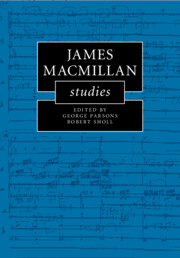Book contents
- James MacMillan Studies
- James MacMillan Studies
- Copyright page
- Contents
- Music Examples
- Tables
- Contributors
- Foreword
- Acknowledgements
- Introduction
- 1 The Struggle with Conviction: A Trio of String Quartets
- 2 Conflicting Modernities and a Modernity of Conflict in James MacMillan’s The World’s Ransoming
- 3 In Memoriam: James MacMillan’s Violin Concerto as Modernist Lament
- 4 Reincarnating The Tryst: The Endurance of a Simple Love Song
- 5 Exquisite Violence: Imagery, Embodiment and Transformation in MacMillan
- 6 Making the Familiar Unfamiliar: MacMillan’s St Luke Passion
- 7 MacMillan’s ‘Mission’ and the Passion Settings
- 8 A Cluster of Gathering Shadows: Exposition and Exegesis in Seven Last Words from the Cross
- 9 James MacMillan’s The Sun Danced: Mary, Miracle and Mysticism
- 10 ‘Shrouded in Doubts and Fears’: The Liturgical Music of James MacMillan
- 11 Containing Chaos? Aspects of Medieval Liturgy in James MacMillan’s Visitatio Sepulchri
- Bibliography
- Index
5 - Exquisite Violence: Imagery, Embodiment and Transformation in MacMillan
Published online by Cambridge University Press: 20 August 2020
- James MacMillan Studies
- James MacMillan Studies
- Copyright page
- Contents
- Music Examples
- Tables
- Contributors
- Foreword
- Acknowledgements
- Introduction
- 1 The Struggle with Conviction: A Trio of String Quartets
- 2 Conflicting Modernities and a Modernity of Conflict in James MacMillan’s The World’s Ransoming
- 3 In Memoriam: James MacMillan’s Violin Concerto as Modernist Lament
- 4 Reincarnating The Tryst: The Endurance of a Simple Love Song
- 5 Exquisite Violence: Imagery, Embodiment and Transformation in MacMillan
- 6 Making the Familiar Unfamiliar: MacMillan’s St Luke Passion
- 7 MacMillan’s ‘Mission’ and the Passion Settings
- 8 A Cluster of Gathering Shadows: Exposition and Exegesis in Seven Last Words from the Cross
- 9 James MacMillan’s The Sun Danced: Mary, Miracle and Mysticism
- 10 ‘Shrouded in Doubts and Fears’: The Liturgical Music of James MacMillan
- 11 Containing Chaos? Aspects of Medieval Liturgy in James MacMillan’s Visitatio Sepulchri
- Bibliography
- Index
Summary
The question of how to make art speak in the modern world is fundamental to MacMillan’s thought. Theologian Olivier Davies describes ‘the reorientation’ of Transformation Theology as like ‘a new tonality in music’, an apposite image for MacMillan’s work. This study begins with an exegesis of two strains of thought. First, like composers such as Messiaen and Pärt, MacMillan creates a topical form of absolute music that sublimates the aesthetics of desire for the absolute. MacMillan’s project also relates to the aesthetics of post-Tridentine violence and realism. Second, with reference to Transformational Theology, MacMillan’s thought configures Christ as present not merely in images but as ‘presently real’. This belief in the ‘real presence of Jesus’ in the world is manifest in images of embodiment in MacMillan’s music that seek to overcome mere representation to function as a form of (en)activism: Jesus - wounded, ascended, glorified - but present and corporeal. The final section draws these ideas together through analysing images of embodiment in MacMillan’s output including in Veni, Veni Emmanuel, the Cello Concerto, and Seven Last Words that profess MacMillan’s resurrection theology, and finding comparison with artists such as Caravaggio.
Keywords
- Type
- Chapter
- Information
- James MacMillan Studies , pp. 87 - 110Publisher: Cambridge University PressPrint publication year: 2020

